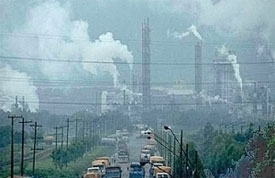No escaping environmental protection tax

>> New green tax set to colour firms’ thinking
>> NA considers gov’t proposal on tax policies
>> Vietnam set to impose green taxes on emissions, plastic bags
Does the environmental protection tax imposition entail a hike on petroleum prices as well as firms’ input costs?
As estimated, total revenue from environmental protection tax collections in 2012 will come to around VND17 trillion ($809.5 million), with around VND16 trillion ($762 million) coming from petroleum sector.
The revenue from petroleum products’ environmental protection tax collections will not increased compared to existing petroleum fee collection amount since in light of the Resolution on Environmental Protection Tariffs just released by National Assembly’s Standing Committee the fee amount towards petrol and aviation fuel is set at VND1,000 per litre, for diesel oil VND500 per litre, for kerosene, mazut and grease VND300 per litre which are tantamount to current petroleum fee levels.
With a proposed environmental protection tax VND1,000 per/litre of petrol, consumers will have to additionally pay VND100 for the value added tax imposed on environmental protection fee when buying petroleum products. Is that the case?
In the supplemented and amended draft to governmental Decree 123/2008/ND-CP on value added tax implementation the Ministry of Finance has proposed to exclude environmental protection tax when calculating petroleum products’ value added tax and it now awaits the government consideration.
Plastic bag usage is also subject to environmental protection tax payment. Will this scale up burdens on consumers?
The Environmental Protection Tax Law works for environmental protection cause and then it bars individuals and organisations from using products which could hurt the environment. The Standing Committee has decided on imposing environmental protection tax rate of VND40,000/kg of plastic bags after it has mulled over all possible implications on firms and people’s lives.
Should there be policies to stimulate production of plastic bag alternatives?
In fact, use of products replacing plastic bags is fairly costly. However, its cost will gradually go down. Under current regulations firms making eco-friendly products are subject to tax breaks. The Ministry of Natural Resources and Environment will soon uncover a list of products on par with environmental protection requirements which are tax free. These products will carry more reasonable price tags in the coming period.
What the stars mean:
★ Poor ★ ★ Promising ★★★ Good ★★★★ Very good ★★★★★ Exceptional
Related Contents
Latest News
More News
- Hermes joins Long Thanh cargo terminal development (February 04, 2026 | 15:59)
- SCG enhances production and distribution in Vietnam (February 04, 2026 | 08:00)
- UNIVACCO strengthens Asia expansion with Vietnam facility (February 03, 2026 | 08:00)
- Cai Mep Ha Port project wins approval with $1.95bn investment (February 02, 2026 | 16:17)
- Repositioning Vietnam in Asia’s manufacturing race (February 02, 2026 | 16:00)
- Manufacturing growth remains solid in early 2026 (February 02, 2026 | 15:28)
- Navigating venture capital trends across the continent (February 02, 2026 | 14:00)
- Motivations to achieve high growth (February 02, 2026 | 11:00)
- Capacity and regulations among British areas of expertise in IFCs (February 02, 2026 | 09:09)
- Transition underway in German investment across Vietnam (February 02, 2026 | 08:00)

 Tag:
Tag:




















 Mobile Version
Mobile Version